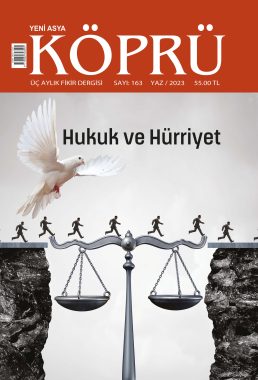In this issue, we do not have a single dossier subject. Instead, we have a rich
format with different subjects.
An important part of the texts in this issue is constituted by the concluding
papers of two Research Conference organized by the Institute of Risale-i Nur, Ankara
Department. These two conferences about "Civil Society" and "Communication" were
conducted as workshops. There have been four desks as Individual and Society; The
Dynamics of a Strong Society; the Constitution of the Democratic Culture; and Non-Governmental
Organizations, on which the issue of Civil Society has been discussed. Other three
desks (Inner-communication; Interpersonal communication, the Communication of Human
Being with the Universe) discussed the issue of "Communication". The results of
each issue were announced through a meeting to the public. Due to our credit to
the importance of necessity and significance of civil society and communication,
we share the concluding proceedings with you.
Rıdvan Ziyaoğlu, in his article of "The Place of Bediüzzaman in the Quarrel between
Bohr and Einstein", mentions about the discussions on the Newtonian Mechanics-Quantum
Physics. He evaluates these theories according to creation and unification ideas
in the works of Bediüzzaman.
Sadık Yalsızuçanlar analyzes in his article Bediüzzaman Said Nursi and the movement
of Risale-i Nur "as an Example of Civil Disobedience". Sailing from the concept
of "positive movement", the author tells us with examples from the life of Bediüzzaman
how he overcame the very difficult impediments he confronted with a great effort
without conceding from his belief. The author also tells us how Bediüzzaman does
not collide with them, but also how he does not also compromise against these difficulties.
Musa K. Yılmaz explains the sincerity as a basic moral theory from the point
of view of Bediüzzaman. Yılmaz also mentions that the spirit of the knowledge of
God, which was the most important consequence and the highest aim of the creation,
of the praying and good deeds is composed of sincerity, while emphasizing the essential
mystery of Islam as sincerity.
Mustafa Özcan, in his article "Islamic Movements and the Concept of Islamic State"
treats the order and state in Islam in an historical perspective. He discusses also
the view of different political streams and religious movements and talks about
the discussion on the Hilafet.
Vehbi Karakaş in his long paper "The Need to Said Nursi in the Context of Knowledge
and Religion and Risale-i Nur" tells us that every Muslim, non-Muslim and even all
of the humanity need Said-i Nursi since he opens an epoch of religious education
for all of the humanity in which the non-believers became believers, believers reach
an higher level of faith. Thus, he saves people from the hell of heresy, the darkness
of denial, the sickness and simplicity of imitation. He sees and reads the universe
as a book so that he embodies the religious silence thinking praised by verses and
the prophetic traditions. The result of this embodiment is a book, Risale-i Nur.
Taha Çağlaroğlu, in his paper of "Oratorio, Novel, Theatre and Bediüzzaman" explains
the meaning, origin and the new forms of oratorio as an art with examples. Also
he tries to unfold the Bediüzzaman's understanding of art with a general framework.
Reha Fırat contributes to the dossier of "Poverty" in our 88th issue with his
article of "Whether Life Quality or Life Standard?" He analyzes the situation of
the individual who indulges himself in the non-satisfied wishes of the consumption
and thinks that he is so worthy as his level of consumption. He turns our attention
to the paradox of the modern individual in forms of "living worse to live better"
who does not object the exploitation of the most private realms of his life.
We wish to meet with you again in our 91st issue as leaving you with our journal
together.

